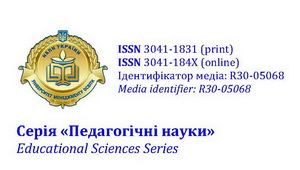The impact of nasimi's ethical-didactic and philosophical views on personality development
Анотація
Ключові слова
Повний текст:
PDF (English)Посилання
REFERENCES / СПИСОК ВИКОРИСТАНИХ ДЖЕРЕЛ
Ə. S. Bədəlova, Təlim-tərbiyə. Bakı, Azərbaycan : ADPU, 2015.
Ş. Cəlili, Seyid İmaməddin Nəsimi: Həqq idi, həqqi dedi, həq söylədi. İstanbul, Türkiyə : İmak Ofset, 2019.
E. N. Əliyeva, «İmadəddin Nəsimi Yaradıcılığının Orta Məktəbdə Tədrisi», Azərbaycan məktəbi, № 2, s. 95–108, 2019. [Online]. Available: https://www.researchgate.net/publication/336170928_Teaching_of_Imaddadin_Nasimi's_works_at_secondary_schools/fulltext/5dea59934585159aa4674a2e/Teaching-of-Imaddadin-Nasimis-works-at-secondary-schools.pdf Application date: October 10, 2024.
E. Gündüz, E. Sevimli, «Nesiminin “Senden dönmezem” radifli gazeline estetik bir yaklaşım», Selçuk Üniversitesi Edebiyat Fakültesi Dergisi, іs. 36, рр. 97–124, 2016. [Online]. Available: https://dergipark.org.tr/tr/download/article-file/267267 Application date: October 10, 2024.
İ. Həbibbəyli, «Cahana sığmayan Azərbaycan şairi», “Azərbaycan” qəzeti, 2019. [Online]. Available: https://science.gov.az/az/news/open/9534 Application date: October 10, 2024.
S. Hüseynoğlu, B. Həsənli, «Nəsimi irsinin orta məktəblərdə tədrisi məsələləri», Azərbaycan dili və ədəbiyyat tədrisi, № 3/4(261–262), рр. 65–78, 2019. [Online]. Available: https://tall.edu.az/web/uploads/archive/253/253.pdf Application date: October 10, 2024.
X. Hümmətova, «Nəsimi şeirində sözün informativ yükü», Əlyazmalar yanmır, vol. 2, is. 9, s. 125–130, 2019. [Online]. Available: http://www.anl.az/down/meqale/elyazmalar_yanmir/2019/02/755058(meqale).pdf Application date: October 10, 2024.
V. C. Xəlilov, Ümümtəhsil məktəblərində tərbiyə işinin təşkili. Təlim prosesində şagirdlərə estetik dəyərlərin aşılanması imkanları. Bakı, Azərbaycan : “CN Poligrafiya”, 2023.
İ. Nəsimi, 40 qəzəl. Bakı, Azərbaycan : Qanun Nəşriyyatı, 2019.
M. F. Köprülü, Türk Edebiyatında İlk Mütasavvıflar. İstanbul, Türkiyə : Alfa, 2014.
Ə. Nəcəfov, «Nəsimi əsərlərinin dili və poetik özəllikləri», Elm və təhsil. Azərtac, 2019. [Online]. Available: https://azertag.az/xeber/nesimi_eserlerinin_dili_ve_poetik_ozellikleri-1263343 Application date: October 10, 2024.
S. Səfərova, «Nəsimi ili: klassik ədəbi irsə müasir baxış, milli və bəşəri ideyaların təbliği», Bakı xəbər, 11 iyun, 2019.
S. Şıxıyeva, «Nəsimi şeirinin fərdi özəllikləri», Nəsimi 650. Azərbaycan şərqşünaslığı, № 1(17), s. 23–32, 2019. [Online]. Available: https://www.elibrary.az/docs/JURNAL/jrn2019_503.pdf Application date: October 10, 2024.
Ümumi təhsil müəssisələrinin 8-ci sinifləri üçün Ədəbiyyat fənni üzrə Dərslik. 2023-036. Bakı, Azərbaycan : Bakı nəşriyyatı, 2023. [Online]. Available: https://www.trims.edu.az/noduploads/book/quot-adabiyyat-quot-fanni-uzra-8-ci-sinif-ucun-darslik-1691674088-465.pdf Application date: October 10, 2024.
TRANSLATED AND TRANSLITERATED / ПЕРЕКЛАД, ТРАНСЛІТЕРАЦІЯ
А. S. Badalova, Education. Baku, Azerbaijan : ASPU, 2015. (in Azerbaijani).
Sh. Jalili, Sayyid Imamuddin Nasimi: It was the truth, he told the truth, he told the truth. Istanbul, Turkey : Imak Offset, 2019. (in Azerbaijani).
E. N. Aliyeva, «Teaching the works of Imadeddin Nasimi in high school», Azerbaijan school, № 2, s. 95–108, 2019. [Online]. Available: https://www.researchgate.net/publication/336170928_Teaching_of_Imaddadin_Nasimi's_works_at_secondary_schools/fulltext/5dea59934585159aa4674a2e/Teaching-of-Imaddadin-Nasimis-works-at-secondary-schools.pdf Application date: October 10, 2024. (in Azerbaijani).
E. Gunduz, E. Sevimli, «Aesthetic approach to Nesimi's ghazal "I will not return from you», Selcuk University Faculty of Letters Journal, іs. 36, рр. 97–124, 2016. [Online]. Available: https://dergipark.org.tr/tr/download/article-file/267267 Application date: October 10, 2024. (in Turkish).
І. Habibbayli, «Azerbaijani poet who does not fit into the world», Newspaper "Azerbaijan", 2019. [Online]. Available: https://science.gov.az/az/news/open/9534 Application date: October 10, 2024. (in Azerbaijani).
S. Huseynoglu, B. Hasanli, «Issues of teaching Nasimi's heritage in comprehensive schools», Teaching the Azerbaijani language and literature, № 3/4(261–262), рр. 65–78, 2019. [Online]. Available: https://tall.edu.az/web/uploads/archive/253/253.pdf Application date: October 10, 2024. (in Azerbaijani).
H. Hummatova, «Substantive load of the word in Nasimi's poem», Manuscripts don’t burn, vol. 2, is. 9, s. 125–130, 2019. [Online]. Available: http://www.anl.az/down/meqale/elyazmalar_yanmir/2019/02/755058(meqale).pdf Application date: October 10, 2024. (in Azerbaijani).
V. V. Khalilov, Organization of educational work in comprehensive schools. Possibilities of instilling aesthetic values in students in the learning process. Baku, Azerbaijan : “ CN Polygraphy”, 2023. (in Azerbaijani).
I. Nasimi, 40 ghazals. Baku, Azerbaijan : Pravo Publishing House, 2019. (in Azerbaijani).
M. F. Koprulu, The first Sufis in Turkish literature. Istanbul, Turkey : Alpha, 2014. (in Turkish).
Ə. Najafov, «Language and poetic features of Nasimi's works», Science and education, 2019. [Online]. Available: https://azertag.az/xeber/nesimi_eserlerinin_dili_ve_poetik_ozellikleri-1263343 Application date: October 10, 2024. (in Azerbaijani).
S. Safarova, «The year of Nasimi: a modern look at the classical literary heritage, propaganda of national and humanitarian ideas», Baku News, June 11, 2019. (in Azerbaijani).
S. Shikhiyeva, «Individual features of Nasimi's poem», Nasimi 650, Azerbaijan Oriental Studies, № 1(17), s. 23–32, 2019. [Online]. Available: https://www.elibrary.az/docs/JURNAL/jrn2019_503.pdf Application date: October 10, 2024. (in Azerbaijani).
Textbook on literature for 8th grades of general education institutions. 2023-036. Baku, Azerbaijan : Baku Publishing House, 2023. [Online]. Available: https://www.trims.edu.az/noduploads/book/quot-adabiyyat-quot-fanni-uzra-8-ci-sinif-ucun-darslik-1691674088-465.pdf Application date: October 10, 2024. (in Azerbaijani).
Посилання
- Поки немає зовнішніх посилань.
